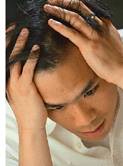Hormone May Play Key Part in Creating Memories
Rise in norepinephrine levels tied to emotionally charged events, study finds.
By Steven Reinberg
HealthDay Reporter
|
E-mail this article
Subscribe to news
Printer friendly version
|

(SOURCES: Roberto Malinow, M.D., Ph.D., Cold Spring Harbor Laboratory, New York; Vadim Bolshakov, Ph.D., director, Cellular Neurobiology Laboratory, McLean Hospital, Belmont, Mass.; Oct. 5, 2007, Cell)
THURSDAY, Oct. 4 (HealthDay News) -- When you experience an emotionally charged event, it's something that is etched into your memory, and now scientists think they know why.
In experiments with mice, researchers found that powerful surges of the hormone norepinephrine -- surges that occur during emotional episodes -- cause a series of events that strengthen the connections between neurons, sealing these events into the memory.
"The question we are addressing is why is it that you can remember some trivial events that occur at a time when there is high emotional arousal," said lead researcher Dr. Roberto Malinow, of the Cold Spring Harbor Laboratory in New York. "For example, everyone remembers where they were when they heard about September 11, even though [they may have been] in some trivial place."
The researchers found that norepinephrine can modify brain cell receptors, making them easier to go into synapses -- the tiny spaces between brain cells -- making it easier to learn and form memories, Malinow said.
In studies with mice, Malinow's group found that norepinephrine, coupled with emotional stress, plays an important role in lowering the threshold for certain brain cell receptors called GluR1. This, in turn, causes a boost in memory, the researchers said.
When the researchers put lab mice through behavioral tests, they found that exposure to norepinephrine made normal mice remember events more clearly. But, mice with mutations of the GluR1 receptors that were exposed to norepinephrine did not show improved memory.
Norepinephrine is known to play a part in the emotional control of memory. During emotional stress, norepinephrine is released by neurons (brain cells) in many areas of the brain, including the hippocampus and the amygdala -- areas involved with forming emotional memories.
The findings are published in the Oct. 5 issue of Cell.
Malinow thinks this finding could lead to new treatments for conditions such as post-traumatic stress disorder.
"It is interesting to find out at the molecular level what emotion is doing," Malinow said. "But there are certain diseases like post-traumatic stress disorder for which we might find targets that have therapeutic benefit. These findings will enhance our knowledge of all diseases that deal with memory."
One expert see this study as an extension of similar work that showed that norepinephrine is involved in the memory of fearful events that can lead to post-traumatic stress disorder.
"In our own work, we have demonstrated that norepinephrine controls the ability of synapses in inputs to the amygdala implicated in cued fear conditioning to undergo long-term potentiation," said Vadim Bolshakov, director of McLean Hospital's Cellular Neurobiology Laboratory, in Belmont, Mass. "This new study complements our work in emphasizing the role of norepinephrine release in the brain in learning and memory mechanisms."
The new research focuses on a different form of learning, Bolshakov said. "The new study nicely demonstrated that norepinephrine enhances a form of learning by facilitating synapses in a region of the hippocampus," he said.
More information
For more on memory, visit the U.S. National Library of Medicine.
Copyright © 2007 ScoutNews, LLC. All rights reserved. 
HealthDayNews articles are derived from various sources and do not reflect federal policy. healthfinder.gov does not endorse opinions, products, or services that may appear in news stories. For more information on health topics in the news, visit the healthfinder.gov health library.